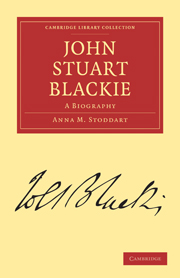Book contents
- Frontmatter
- PREFACE TO THE FIRST EDITION
- Contents
- CHAPTER I PARENTAGE AND CHILDHOOD. 1809–1819
- CHAPTER II AT SCHOOL AND COLLEGE. 1820–1829
- CHAPTER III STUDENT LIFE IN GÖTTINGEN. 1829
- CHAPTER IV STUDENT LIFE IN BERLIN. 1829–1830
- CHAPTER V ROME. 1830–1831
- CHAPTER VI END OF WANDERJAHRE. 1831–1832
- CHAPTER VII YEARS OF STRUGGLE. 1832–1837
- CHAPTER VIII THE TEST ACTS. 1837–1840
- CHAPTER IX INSTALLATION AND MARRIAGE. 1841–1842
- CHAPTER X ABERDEEN AND UNIVERSITY REFORM. 1842–1850
- CHAPTER XI ‘ÆSCHYLUS’ AND THE GREEK CHAIR. 1850–1852
- CHAPTER XII EDINBURGH. 1852–1857
- CHAPTER XIII LAYS, LECTURES, AND LYRICS. 1857–1860
- CHAPTER XIV HOMER. 1861–1866
- CHAPTER XV THE HIGHLANDS AND ISLANDS. 1866–1870
- CHAPTER XVI PILGRIM YEARS. 1870–1872
- CHAPTER XVII ‘SELF-CULTURE.’ 1873–1874
- CHAPTER XVIII THE CELTIC CHAIR. 1875–1876
- CHAPTER XIX EGYPT. 1876–1879
- CHAPTER XX RETIREMENT FROM THE GREEK CHAIR. 1880–1882
- CHAPTER XXI CLASS-ROOM AND PLATFORM. 1841–1882
- CHAPTER XXII RECREATIONS OF AN EMERITUS PROFESSOR. 1882–1887
- CHAPTER XXIII “LIVING GREEK.” 1888–1891
- CHAPTER XXIV CLOSING YEARS. 1892–1895
- INDEX
CHAPTER XIX - EGYPT. 1876–1879
Published online by Cambridge University Press: 05 October 2010
- Frontmatter
- PREFACE TO THE FIRST EDITION
- Contents
- CHAPTER I PARENTAGE AND CHILDHOOD. 1809–1819
- CHAPTER II AT SCHOOL AND COLLEGE. 1820–1829
- CHAPTER III STUDENT LIFE IN GÖTTINGEN. 1829
- CHAPTER IV STUDENT LIFE IN BERLIN. 1829–1830
- CHAPTER V ROME. 1830–1831
- CHAPTER VI END OF WANDERJAHRE. 1831–1832
- CHAPTER VII YEARS OF STRUGGLE. 1832–1837
- CHAPTER VIII THE TEST ACTS. 1837–1840
- CHAPTER IX INSTALLATION AND MARRIAGE. 1841–1842
- CHAPTER X ABERDEEN AND UNIVERSITY REFORM. 1842–1850
- CHAPTER XI ‘ÆSCHYLUS’ AND THE GREEK CHAIR. 1850–1852
- CHAPTER XII EDINBURGH. 1852–1857
- CHAPTER XIII LAYS, LECTURES, AND LYRICS. 1857–1860
- CHAPTER XIV HOMER. 1861–1866
- CHAPTER XV THE HIGHLANDS AND ISLANDS. 1866–1870
- CHAPTER XVI PILGRIM YEARS. 1870–1872
- CHAPTER XVII ‘SELF-CULTURE.’ 1873–1874
- CHAPTER XVIII THE CELTIC CHAIR. 1875–1876
- CHAPTER XIX EGYPT. 1876–1879
- CHAPTER XX RETIREMENT FROM THE GREEK CHAIR. 1880–1882
- CHAPTER XXI CLASS-ROOM AND PLATFORM. 1841–1882
- CHAPTER XXII RECREATIONS OF AN EMERITUS PROFESSOR. 1882–1887
- CHAPTER XXIII “LIVING GREEK.” 1888–1891
- CHAPTER XXIV CLOSING YEARS. 1892–1895
- INDEX
Summary
A correspondence in the ‘Scotsman,’ roused by Professor Blackie's poem called “Canaries and Creeds,” indicates the troubled waters of theological controversy in Scotland during that year and those following. The epoch had its loud pretensions to infallibility, its response in the acclaim of the ignorant, its inquisitors, its traitors, its martyrs, its outcome of the triumph of a wider revelation for which its martyrs suffered, and for which they now are crowned.
Occupied with his College duties and with lectures at Galashiels, Linlithgow, and Govan, he was able to grant Mrs Blackie a very unwonted leave of absence in London, where a new but already greatly valued friend had claimed her presence. This was Miss Pipe of Laleham, who became acquainted with Altnacraig in the summer of 1876, and whose school in Clapham Park had for many years heralded and achieved the larger, stronger, and more radical education for girls, now become a commonplace of our time.
During his wife's absence many letters on the subject of his book on Gaelic reached him, and on her return he went north to Inverness for a couple of days on Celtic Chair business. On this subject Mr Froude wrote to him early in February:—
If you are to preserve your native wild Flora, your Gaelic saxifrages and mountain roses, you must preserve them yourselves, as the Welsh do. You yourself are acting well and wisely in protesting agamst so interesting a relic of other times being allowed to die. But Gaelic, I suppose, can only be really kept alive like one of ourselves—by continuing to live. […]
- Type
- Chapter
- Information
- John Stuart BlackieA Biography, pp. 321 - 346Publisher: Cambridge University PressPrint publication year: 2010First published in: 1896



